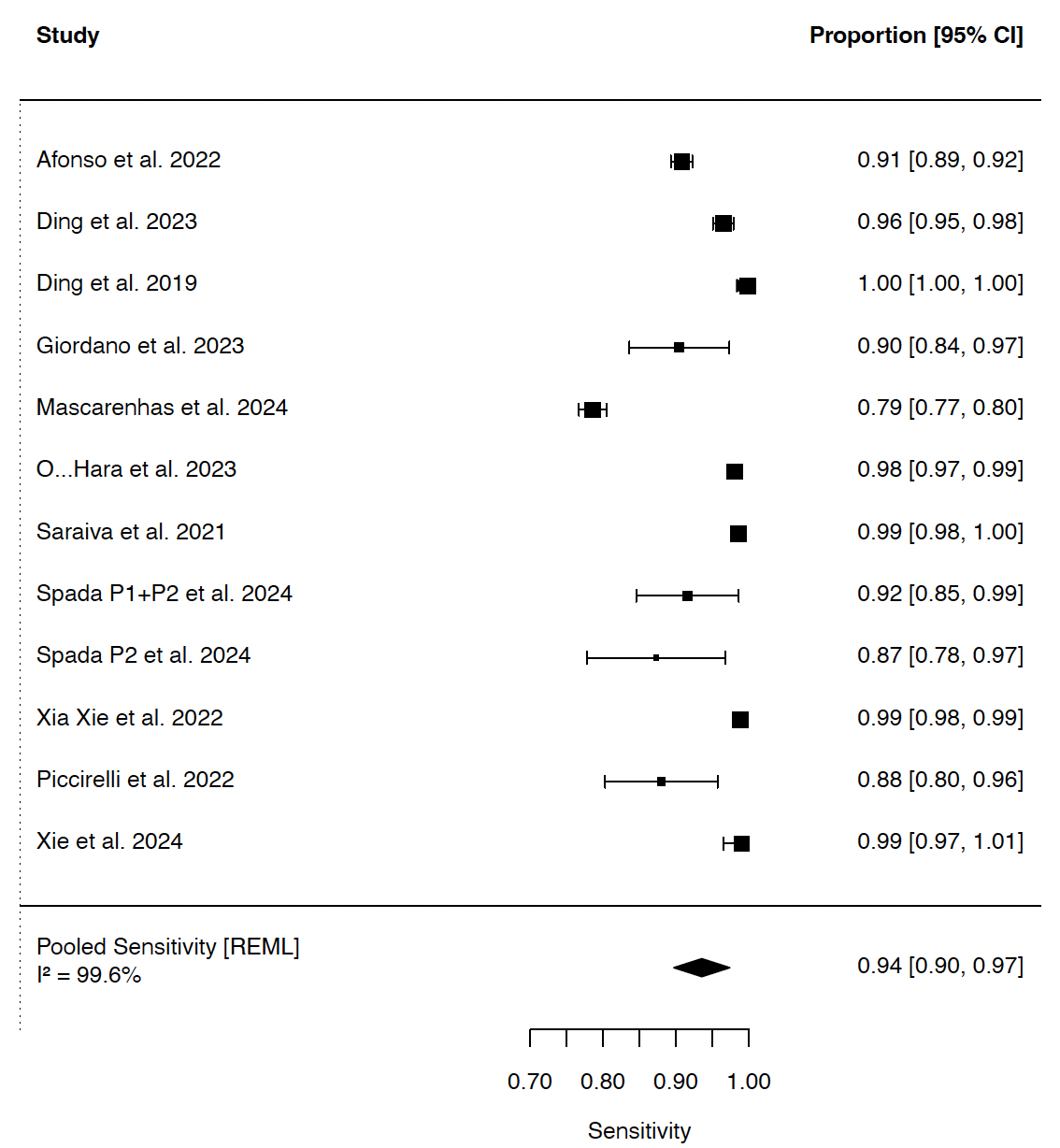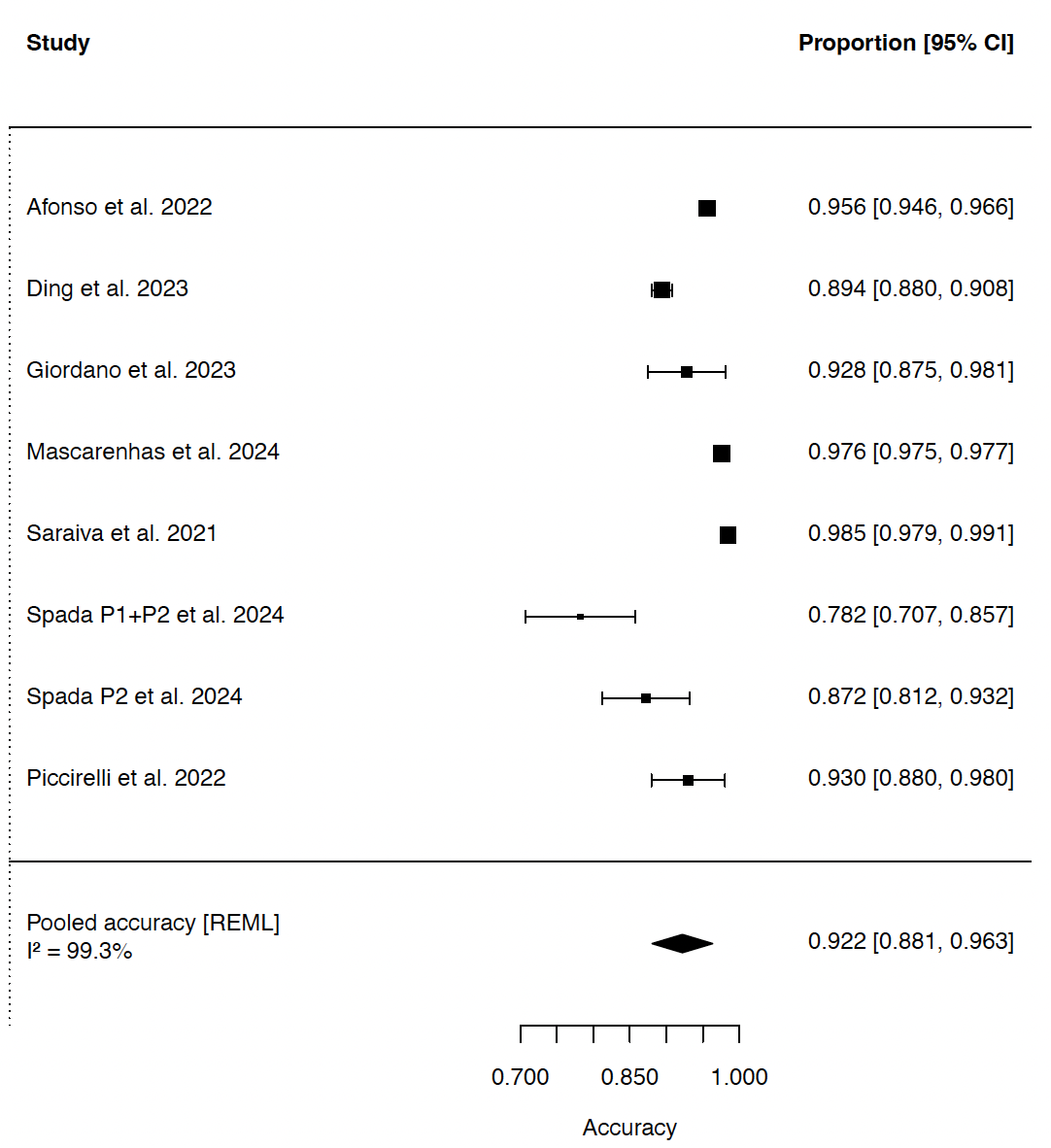Monday Poster Session
Category: Small Intestine
P4073 - AI-Assisted versus Conventional Video Capsule Endoscopy for Detection of Small Intestinal Lesions: A Systematic Review and Meta-analysis
Monday, October 27, 2025
10:30 AM - 4:00 PM PDT
Location: Exhibit Hall
.jpg)
Saqr Alsakarneh, MD, MS (he/him/his)
Mayo Clinic
Rochester, MN
Presenting Author(s)
Saqr Alsakarneh, MD, MS1, Osama Asad, MD2, Razan Aburumman, MD3, Mohammad Abuassi, MD4, Yazan Abboud, MD5, Mohamad Adam, MD2, Fazel Dinary, MD6, Mohammad Bilal, MD, FACG7
1Mayo Clinic, Kansas City, MO; 2University of Missouri - Kansas City School of Medicine, Kansas City, MO; 3Henry Ford Health, Detroit, MI; 4University of Central Florida, HCA Healthcare GME, Gainesville, FL; 5Rutgers New Jersey Medical School, Newark, NJ; 6University Hospital, Cleveland, OH; 7University of Colorado Anschutz Medical Campus, Denver, CO
Introduction: Video capsule endoscopy (VCE) is the gold standard for evaluating the small intestine but is limited by its time-consuming nature and reader fatigue, leading to variability in interpretation. Artificial intelligence (AI) has shown promise in enhancing lesion detection and diagnostic performance. This meta-analysis aimed to compare the diagnostic performance of AI-assisted versus conventional VCE in detecting small intestinal lesions.
Methods: A systematic search of MEDLINE, Embase, and Cochrane databases was conducted from inception through May 2025 for studies comparing diagnostic performance of AI-assisted VCE to conventional VCE in small bowel pathologies. The primary outcome was diagnostic sensitivity. Secondary outcomes included accuracy, specificity, positive predictive value (PPV), and negative predictive value (NPV). Pooled estimates and 95% confidence intervals (CIs) were calculated using a random-effects model with the metafor package in R. Between-study heterogeneity was assessed using the I² statistic.
Results: Sixteen studies met the inclusion criteria. AI-assisted VCE demonstrated a higher pooled diagnostic sensitivity of 0.94 [95% CI: 0.90–0.97; Figure 1] compared to 0.84 [95% CI: 0.75–0.93] with conventional VCE. Pooled diagnostic accuracy was 0.92 [95% CI: 0.88–0.96] for AI-assisted VCE (Figure 2) and 0.96 [95% CI: 0.94–0.98] for conventional VCE. Specificity was higher with conventional VCE (0.99 [95% CI: 0.99–1.00]) than with AI-assisted VCE (0.93 [95% CI: 0.86–0.99]). AI-assisted VCE showed higher negative predictive values, while conventional VCE had higher positive predictive values. Heterogeneity was moderate to high (I²: 45%–75%), likely due to variations in AI algorithms and lesion types.
Discussion: This meta-analysis shows that AI-assisted video capsule endoscopy significantly improves sensitivity and NPV, reducing missed lesions and supporting its integration into clinical workflows to enhance diagnostic accuracy and efficiency in small bowel evaluations.

Figure: Figure 1. Forest Plot of Pooled Diagnostic Sensitivity

Figure: Figure 2. Forest Plot of Pooled Diagnostic Accuracy
Disclosures:
Saqr Alsakarneh indicated no relevant financial relationships.
Osama Asad indicated no relevant financial relationships.
Razan Aburumman indicated no relevant financial relationships.
Mohammad Abuassi indicated no relevant financial relationships.
Yazan Abboud indicated no relevant financial relationships.
Mohamad Adam indicated no relevant financial relationships.
Fazel Dinary indicated no relevant financial relationships.
Mohammad Bilal: Boston Scientific – Consultant. Cook endoscopy – Paid speaker. Steris Endoscopy – Consultant.
Saqr Alsakarneh, MD, MS1, Osama Asad, MD2, Razan Aburumman, MD3, Mohammad Abuassi, MD4, Yazan Abboud, MD5, Mohamad Adam, MD2, Fazel Dinary, MD6, Mohammad Bilal, MD, FACG7. P4073 - AI-Assisted versus Conventional Video Capsule Endoscopy for Detection of Small Intestinal Lesions: A Systematic Review and Meta-analysis, ACG 2025 Annual Scientific Meeting Abstracts. Phoenix, AZ: American College of Gastroenterology.
1Mayo Clinic, Kansas City, MO; 2University of Missouri - Kansas City School of Medicine, Kansas City, MO; 3Henry Ford Health, Detroit, MI; 4University of Central Florida, HCA Healthcare GME, Gainesville, FL; 5Rutgers New Jersey Medical School, Newark, NJ; 6University Hospital, Cleveland, OH; 7University of Colorado Anschutz Medical Campus, Denver, CO
Introduction: Video capsule endoscopy (VCE) is the gold standard for evaluating the small intestine but is limited by its time-consuming nature and reader fatigue, leading to variability in interpretation. Artificial intelligence (AI) has shown promise in enhancing lesion detection and diagnostic performance. This meta-analysis aimed to compare the diagnostic performance of AI-assisted versus conventional VCE in detecting small intestinal lesions.
Methods: A systematic search of MEDLINE, Embase, and Cochrane databases was conducted from inception through May 2025 for studies comparing diagnostic performance of AI-assisted VCE to conventional VCE in small bowel pathologies. The primary outcome was diagnostic sensitivity. Secondary outcomes included accuracy, specificity, positive predictive value (PPV), and negative predictive value (NPV). Pooled estimates and 95% confidence intervals (CIs) were calculated using a random-effects model with the metafor package in R. Between-study heterogeneity was assessed using the I² statistic.
Results: Sixteen studies met the inclusion criteria. AI-assisted VCE demonstrated a higher pooled diagnostic sensitivity of 0.94 [95% CI: 0.90–0.97; Figure 1] compared to 0.84 [95% CI: 0.75–0.93] with conventional VCE. Pooled diagnostic accuracy was 0.92 [95% CI: 0.88–0.96] for AI-assisted VCE (Figure 2) and 0.96 [95% CI: 0.94–0.98] for conventional VCE. Specificity was higher with conventional VCE (0.99 [95% CI: 0.99–1.00]) than with AI-assisted VCE (0.93 [95% CI: 0.86–0.99]). AI-assisted VCE showed higher negative predictive values, while conventional VCE had higher positive predictive values. Heterogeneity was moderate to high (I²: 45%–75%), likely due to variations in AI algorithms and lesion types.
Discussion: This meta-analysis shows that AI-assisted video capsule endoscopy significantly improves sensitivity and NPV, reducing missed lesions and supporting its integration into clinical workflows to enhance diagnostic accuracy and efficiency in small bowel evaluations.

Figure: Figure 1. Forest Plot of Pooled Diagnostic Sensitivity

Figure: Figure 2. Forest Plot of Pooled Diagnostic Accuracy
Disclosures:
Saqr Alsakarneh indicated no relevant financial relationships.
Osama Asad indicated no relevant financial relationships.
Razan Aburumman indicated no relevant financial relationships.
Mohammad Abuassi indicated no relevant financial relationships.
Yazan Abboud indicated no relevant financial relationships.
Mohamad Adam indicated no relevant financial relationships.
Fazel Dinary indicated no relevant financial relationships.
Mohammad Bilal: Boston Scientific – Consultant. Cook endoscopy – Paid speaker. Steris Endoscopy – Consultant.
Saqr Alsakarneh, MD, MS1, Osama Asad, MD2, Razan Aburumman, MD3, Mohammad Abuassi, MD4, Yazan Abboud, MD5, Mohamad Adam, MD2, Fazel Dinary, MD6, Mohammad Bilal, MD, FACG7. P4073 - AI-Assisted versus Conventional Video Capsule Endoscopy for Detection of Small Intestinal Lesions: A Systematic Review and Meta-analysis, ACG 2025 Annual Scientific Meeting Abstracts. Phoenix, AZ: American College of Gastroenterology.
